小学英语时态讲解及练习可直接打印
- 格式:doc
- 大小:38.57 KB
- 文档页数:14
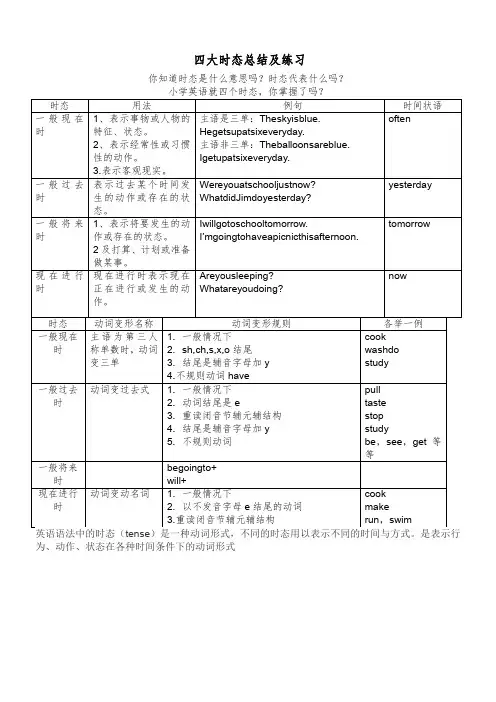
四大时态总结及练习你知道时态是什么意思吗?时态代表什么吗?小学英语就四个时态,你掌握了吗?时态用法例句时间状语一般现在时1、表示事物或人物的特征、状态。
2、表示经常性或习惯性的动作。
3.表示客观现实。
主语是三单:Theskyisblue.Hegetsupatsixeveryday.主语非三单:Theballoonsareblue.Igetupatsixeveryday.often一般过去时表示过去某个时间发生的动作或存在的状态。
Wereyouatschooljustnow?WhatdidJimdoyesterday?yesterday一般将来时1、表示将要发生的动作或存在的状态。
2及打算、计划或准备做某事。
Iwillgotoschooltomorrow.I’mgoingtohaveapicnicthisafternoon.tomorrow现在进行时现在进行时表示现在正在进行或发生的动作。
Areyousleeping?Whatareyoudoing?now时态动词变形名称动词变形规则各举一例一般现在时主语为第三人称单数时,动词变三单1. 一般情况下2. sh,ch,s,x,o结尾3. 结尾是辅音字母加y4.不规则动词havecookwashdostudy一般过去时动词变过去式 1. 一般情况下2. 动词结尾是e3. 重读闭音节辅元辅结构4. 结尾是辅音字母加y5. 不规则动词pulltastestopstudybe,see,get等等一般将来时begoingto+ will+现在进行时动词变动名词 1. 一般情况下2. 以不发音字母e结尾的动词3.重读闭音节辅元辅结构cookmakerun,swim英语语法中的时态(tense)是一种动词形式,不同的时态用以表示不同的时间与方式。
是表示行为、动作、状态在各种时间条件下的动词形式多加练习,百战不殆之时态一、选择最佳的答案:1.____Aliceoftenplaythepiano?No,she_____.A.Do;doB.Does;doesC.Does;doesn't2.___yourpenpal__inBeijing?A.Do;liveB.Do;livesC.Does;live3.TomandMike__veryexcited,theywilltakeatrip.A.isB.areC.am4.Ilike________verymuch.Whataboutyou?A.danceB.dancedC.dancing5.Thekite____abird.A.looklikeB.islookingC.lookslike6.BillandI___goodfriends.A.isB.areC.am7.Sandyoften___hishomeworkonSundays.A.doB.doesC.did8.Whatdoyouusuallydoontheweekend?I__________.A.wentswimmingB.goswimmingC.visitedgrandparents9.Whatdoyouusuallydoonyourholiday?Iusually__________.A.sawelephantsB.singanddanceC.tookpicture10.I____astudent.Igotoschool____buseveryday.A.is;byB.am;onC.am;by11.I____abrother.She____asister.A.have;hasB.has;hasC.have;have12.You____astudent.He____ateacher.A.is;isB.are;isC.are;are13.Healways_____footballgames.A.watchesB.watchC.doesn't14.Mybestfriend_____shells.A.collectsB.collectC.often15.Shedoesn’t_____listeningtothemusic.A.oftenB.likeC.likes16.MymotherandI___alwayswatchromanticfilms.A.doesn’tB.don’tC.do17.---When_____heusuallygethomeonFriday?----HeusuallygetshomeatfouronFriday.A.doB.doesC.did18,.Summer_________spring.esafteresinesbefore19.Everyone____totheirteacherintheclassroom.A.arelisteningB.islisteningC.listen20.Theyaresingingand___togetheratthepartynow.A.danceB.dancedC.dancing21.Listen!Thebirds____.A.issingingB.aresingC.aresinging22.Look!Thekite___inthesky.A.flyB.fliesC.isflying23.They____ridingaforse.A.isB.areC.am24.Kate____playingchess.A.amB.isC.are25.Areyouwashingclothes?A.Yes,youareB.Yes,IamC.No,Iam26.Ishe____TV?Yes,heis.A.watchB.watchingC.not27.____theytakingpictures.?Yes,theyare.A.AmB.BeC.Are28.It’s10o’clock.Ben_____TVinthebedroom.A.watchB.iswatchingC.watches29.I___presentsformyparentsyesterday.A.buyedB.boughtC.buying30.Susan_____swimmingyesterday.A.goB.goesC.went31.Danny_____breakfastfivetimeslastweek.A.eatB.ateC.eatedstSunday____TreePlantingDay.A.isB.wereC.was33.I____alotfromourtextbook.A.learnedB.learnesC.learning34.We____tothezooand___alotofanimalsyesterday.A.go;seeB.went;sawC.goes;sees35.Whatdidyoudolastweekend?--I_________A.readabookB.washtheclothesC.gofishing36.Whatdidyoudoonyourholiday?I________A.boughtapresentB.goskiingC.learnEnglish37.Whatdidhe_____yesterday?He____hishomework.A.did;didB.do;didC.do;do38.YesterdaymypresentsandI____ourhouse.A.werecleaningB.cleanedC.aregoingtoclean39.What_____totreesinthedifferentseasons?A.happenB.happensC.happenedstsummer.I____inthelakeandplayedonthebeach.A.swimB.swamC.willswim41.DidyoueatgoodfoodinChina?______.A.Yes,IdoB.No,Ididn’tC.No,Idid42.Weplayedbasketball_____.A.sometimesB.onSaturdaysstSaturday43.I’mgoingto___somechopsticks___Sundayafternoon.A.bought;onB.buy;onC.buy;on44.WhenareyougoingtoHongKong?I’mgoingthere____.A.thisweekendB.byplaneC.yesterday45.I’mgoingto____myfriendsthisweekend.A.visitB.visitedC.visiting46.I’mgoingto____homeworktomorrow.A.doesB.doC.did47.Areyougoingtotakeapianoclass?____A.No,wenotB.No,IamC.Yes,Iam48.Iam___eatbreakfastat7:15.A.willB.goingtoC.shall49.Wearegoingto____totheparktomorrow.A.goB.goesC.going50.Whatfilmareyougoingto______?A.seeB.watchC.look51.We_____aplaytomorrow.Willyoupleasejoinus?A.aregoingtoseeB.sawC.sees52.He___aracewithMingMing.A.shallhaveB.willhaveC.goingtohave53.Where_____yougotomorrow?A.areB.willC.shall54.___hisbrothergoingtoclimbmountains?A.IsB.AreC.Am55.Look!It_____.A.willsnowingB.isgoingtosnowC.snows56.I____freethisafternoon.A.beB.willbeC.goingtobe57.Theywill____roastducksinBeijing.A.ateB.eatsC.eat58.I__visitmyfriendsthisweekend.A.gotoB.amgoingtoC.goingto二、按照要求改写句子1.DanielwatchesTVeveryevening.(改为否定句)___________________________________________________2.Idomyhomeworkeveryday.(改为一般疑问句,作否定回答)________________________________________________________ 3.Shelikesmilk.(改为一般疑问句,作肯定回答)___________________________4.Amylikesplayingcomputergames.(改为一般疑问句,作否定回答)___________________________________________________5.Iliketakingphotosinthepark.(对划线部分提问)________________________________________________________ 6.JohncomesfromCanada.(对划线部分提问)___________________________________________________7.Nancyisgoingtogocamping.(改否定)??Nancy________goingtogocamping.1.I’llgoandjointhem.(改否定)??I_______go______jointhem.2.I’mgoingtogetupat6:30tomorrow.(改一般疑问句)??_______________________togetupat6:30tomorrow?3.Wewillmeetatthebusstopat10:30.(改一般疑问句)??_______________meetatthebusstopat10:30.4.Sheisgoingtolistentomusicafterschool.(对划线部分提问)??_______________she_________________________afterschool?5.Myfatherandmotheraregoingtoseeaplaythedayaftertomorrow.(同上) ??__________________goingtoseeaplaythedayaftertomorrow.1.Therewasacarinfrontofthehousejustnow.否定句:________________________________________________ 一般疑问句:____________________________________________ 肯、否定回答:__________________________________________ 肯、否定回答:__________________________________________一.按要求改写句子2.Theboyisplayingbasketball.否定句:____________________________一般疑问句:_________________________肯定回答:__________________________否定回答:__________________________对“isplayingbasketball”提问:__________________________对“Theboy”提问:__________________________3.Theyaresingingintheclassroom.否定句:____________________________一般疑问句:_________________________肯定回答:__________________________否定回答:__________________________对“aresinging”提问:__________________________对“intheclassroom”提问:__________________________三、用括号内动词的适当形式填空。
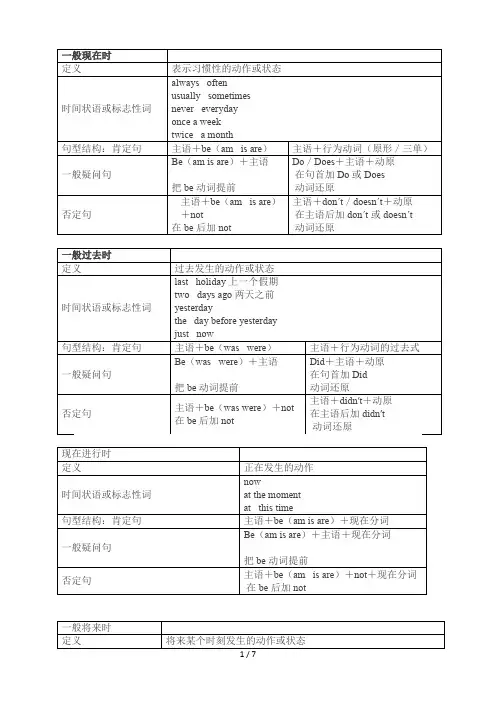
4. 以o结尾的单词: 有生命加s 。
tomato-tomatoespotato-potatoes无生命加espiano-pianosphoto-photoszoo-zoosradio-radios小升初时态专题综合训练1.(成都市青羊区小学毕业卷)John _____ football.A. likes playingB. likes playC. like play2.(深圳市龙岗区小学毕业卷)Does your mother _____ football?A. likeB. likesC. like play3.(芜湖市第三中学招生卷)They usually _____ TV in the evening.A. watchB. will watchC. are watchingD. watches4.(上海市奉贤区小学毕业卷)—What do you usually do on the weekend?—I often ____.A. do my homeworkB. did my homeworkC. doing my homework5. (杭州市西湖区小学毕业卷)I don’t like _____ thril lers(恐怖片)______ playing baseball.A. watching; orB. watching; andC. to watch; or6.(菏泽市晨曦中学招生卷)Bob often _____ to school.A. walkB. walksC. walked7.(南昌铁路一中初中部招生卷)My pen ______ on my desk ten minutes ago.But it _____ there now.A. is; isn’tB. was; isn’tC. is; is8.(长沙市宁乡县小学毕业卷)Mike is _____ after his classmates.A. runsB. runingC. running9.(桂林市奎光学校招生卷)Be quiet! The babies ________.A. sleepB. are sleepingC. slept10. (武汉市青山区小学毕业卷)______ he _____ his homework yesterday?A. Does; doB. Did; didC. Did; do11(北京市朝阳区小学毕业卷)—What did you do last weekend?—I ______.A. go swimmingB. did my homeworkC. went swim12.(芜湖市第十一中学招生卷)—What’s your hobby?—_____ is my hobby.A. Collecting stampsB. Collect stampsC. Stamps13.(广州市白云区小学毕业卷)—Where were you just now?—I _____ at school.A. isB. wasC. were14.(武汉市青山区小学毕业卷)______ he ______ his grandparents lastmonth?A. Did; visitedB. Did; visitC. Do; visited15.(郑州市二七区小学毕业卷)Last week, we _____ a _____ race.A. hard; runningB. have; runningC. had; running16.(福州市仓山区小学毕业卷)I______ to the park last week.A. goB. wentC. going17.(合肥市蜀山区小学毕业卷)If I _____ you tomorrow, I will give youthe receipt(收据)。
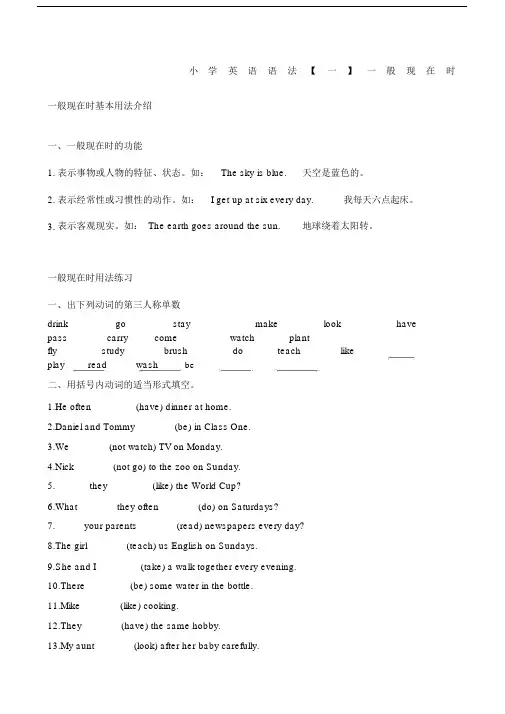
小学英语语法【一】一般现在时一般现在时基本用法介绍一、一般现在时的功能1.表示事物或人物的特征、状态。
如:The sky is blue.天空是蓝色的。
2.表示经常性或习惯性的动作。
如:I get up at six every day.我每天六点起床。
3.表示客观现实。
如: The earth goes around the sun.地球绕着太阳转。
一般现在时用法练习一、出下列动词的第三人称单数drink ________ go _______ stay________ make ________look _________ have_______ pass_______ carry ____ come________ watch______ plant_______fly ________study_______ brush________ do______ teach_______ likeplay read wash be二、用括号内动词的适当形式填空。
1.He often ________(have) dinner at home.2.Daniel and Tommy _______(be) in Class One.3.We _______(not watch) TV on Monday.4.Nick _______(not go) to the zoo on Sunday.5.______ they ________(like) the World Cup?6.What _______they often _______(do) on Saturdays?7._____ your parents _______(read) newspapers every day?8.The girl _______(teach) us English on Sundays.9.She and I ________(take) a walk together every evening.10.There ________(be) some water in the bottle.11.Mike _______(like) cooking.12.They _______(have) the same hobby.13.My aunt _______(look) after her baby carefully.14.You always _______(do) your homework well.15.I _______(be) ill. I’m staying in bed.16.She _______(go) to school from Monday to Friday.17.Liu Tao _______(do) not like PE.18.The child often _______(watch) TV in the evening.19.Su Hai and Su Yang _____(have) eight lessons this term.20. - What day _____(be) it today?-It’s Saturday.三、按照要求改写句子2.I do my homework every day.(改为一般疑问句,作否定回答)_____________________________________________________3.She likes milk.(改为一般疑问句,作肯定回答)__________________________4.Amy likes playing computer games.(改为一般疑问句,作否定回答)___________________________________6.He speaks English very well.(改为否定句)_______________________________________________7.John comes from Canada.(对划线部分提问)_______________________一般现在时练习1. He often(have) dinner at home.2. Daniel and Tommy(be) in Class One.3. We(not watch) TV on Monday.4. Nick(not go) to the zoo on Sunday.5.they(like)the World Cup?6. What they often(do) on Saturdays?7.your parents(read)newspapers every day?8. The girl(teach)us English on Sundays.9. She and I(take) a walk together every evening.10. There(be) some water in the bottle.小学英语语法【二】现在进行时现在进行时1.现在进行时表示现在正在进行或发生的动作,也可表示当前一段时间内的活动或现阶段正在进行的动作。
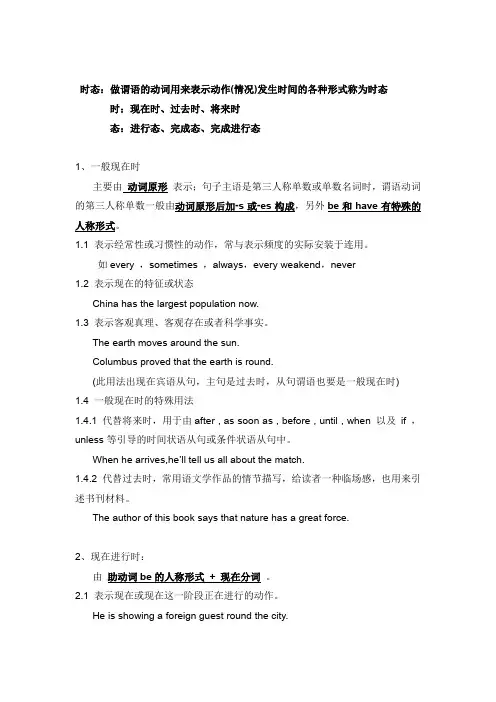
时态:做谓语的动词用来表示动作(情况)发生时间的各种形式称为时态时:现在时、过去时、将来时态:进行态、完成态、完成进行态1、一般现在时主要由动词原形表示;句子主语是第三人称单数或单数名词时,谓语动词的第三人称单数一般由动词原形后加-s或-es构成,另外be和have有特殊的人称形式。
1.1 表示经常性或习惯性的动作,常与表示频度的实际安装于连用。
如every ,sometimes ,always,every weakend,never1.2 表示现在的特征或状态China has the largest population now.1.3 表示客观真理、客观存在或者科学事实。
The earth moves around the sun.Columbus proved that the earth is round.(此用法出现在宾语从句,主句是过去时,从句谓语也要是一般现在时)1.4 一般现在时的特殊用法1.4.1 代替将来时,用于由after , as soon as , before , until , when 以及if ,unless等引导的时间状语从句或条件状语从句中。
When he arrives,he’ll tell us all about the match.1.4.2 代替过去时,常用语文学作品的情节描写,给读者一种临场感,也用来引述书刊材料。
The author of this book says that nature has a great force.2、现在进行时:由助动词be的人称形式+ 现在分词。
2.1 表示现在或现在这一阶段正在进行的动作。
He is showing a foreign guest round the city.2.2 表示一个在最近按计划或安排要进行的动作。
(这时多有一个表示未来时间的状语)A foreigner is giving a lecture this afternoon.2.3 代替一般现在时,表示一个经常性的状态。
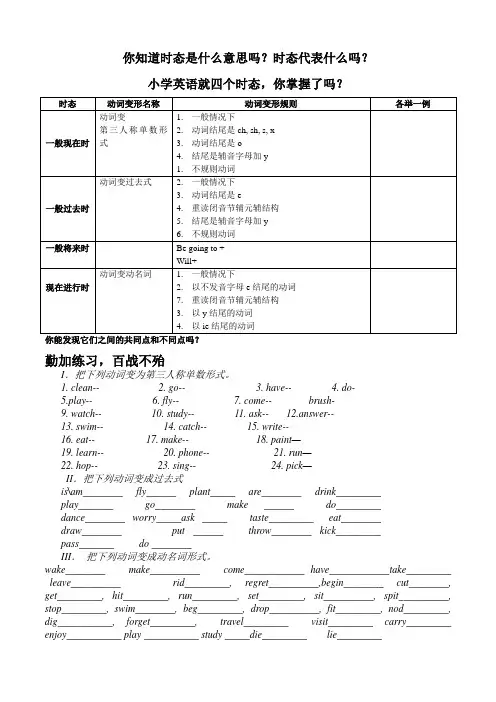
你知道时态是什么意思吗?时态代表什么吗?小学英语就四个时态,你掌握了吗?你能发现它们之间的共同点和不同点吗?勤加练习,百战不殆I.把下列动词变为第三人称单数形式。
1. clean--2. go--3. have--4. do-5.play--6. fly--7. come-- brush-9. watch-- 10. study-- 11. ask-- 12.answer--13. swim-- 14. catch-- 15. write--16. eat-- 17. make-- 18. paint—19. learn-- 20. phone-- 21. run—22. hop-- 23. sing-- 24. pick—II.把下列动词变成过去式is\am________ fly______ plant_____ are________ drink_________play_______ go________ make ______ do_________dance________ worry_____ask _____ taste_________ eat________draw________ put ______ throw________ kick_________pass_______ do ________III.把下列动词变成动名词形式。
wake________ make__________ come____________ have____________take_________ leave__________ rid_________, regret__________,begin________ cut________, get_________, hit_________, run_________, set_________, sit__________, spit__________, stop_________, swim________, beg_________, drop__________, fit_________, nod_________, dig___________, forget_________, travel_________ visit_________ carry_________ enjoy___________ play ___________ study _____die_________ lie_________多加练习,百战不殆之时态篇一、用单词的正确形式填空:1.Mike _________ (do) his homework every day.2.There __________(be) some water in the glass.3.We like ________ (play) basketball after class.4.I like singing. I often _________(listen) to the music in the evening.5.My grandma_________(watch) TV every day.三、选择最佳的答案:1. ____Alice often play the piano? No, she _____. A. Do; do B. Does; does C. Does; doesn't2. ___ your penpal __ in Beijing? A. Do; live B. Do; lives C. Does; live3. Tom and Mike __ very excited, they will take a trip. A. is B. are C. am4. I like ________ very much. What about you? A. dance B. danced C. dancing5. The kite ____ a bird. A. look like B. is looking C. looks like6. Bill and I ___ good friends. A. is B. are C. am7. Sandy often ___ his homework on Sundays . A. do B. does C. did8. What do you usually do on the weekend? I __________.A. went swimmingB. go swimmingC. visited grandparents9. What do you usually do on your holiday? I usually __________.A. saw elephantsB. sing and danceC.took picture10. I ____ a student. I go to school ____bus every day. A. is; by B. am; on C. am; by11. I ____ a brother. She ____ a sister. A. have; has B. has; has C. have; have12. You ____ a student. He ____ a teacher. A. is; is B. are; is C. are; are13. He always _____ football games. A. watches B. watch C. doesn't14. My best friend _____ shells. A. collects B. collect C. often15. She doesn’t _____ listening to the music. A. often B. like C. likes16. My mother and I ___ always watch romantic films. A. doesn’t B. don’t C. do17. ---When _____ he get home on Friday?----He gets home at four on Friday. A. do B. does C. did18.Summer _________ spring.A. comes afterB. comes ines before二、用单词的适当形式填空:1. look! Chen Jie and Mike are ___________(sing)now.2. The small bear is _____________ (climb) the tree.3. Mike is ________________ (draw) picture.4. She is ________________ (do) the dishes.5. My brother __________ (make) kites now.6. My father is ___________ (read) a newspaper in living room.7. Ted is __________(answer) the phone.8. My uncle is ____________ (drive) a car.9. The students are ______________(listen) to their teacher carefully.10. Chen Jie is _________(wash) clothes.11. His sister _______ (be) writing an e-mail.12. We ______(be) cleaning the classroom now.13. I____ (be)working on my computer.14. They _____ (be)playing basketball.15. Look, The tiger ________ __________(walk).16. Look, The elephants ______ _____________(drink) water with their trunk.17. Look, The monkeys ________ ___________ (swing).18. Peter _________ ______________(take) pictures now.19. They _____ ________(take)up the apples now.20. We _______ ________(catch) butterflies now.三、选择正确答案1. Every one ____ to their teacher in the classroom. A. are listening B. is listening C. listen2. They are singing and ___ together at the party now. A. dance B. danced C. dancing3. Listen! The birds ____. A. is singing B. are sing C. are singing4. Look! The kite ___ in the sky. A. fly B. flies C. is flying5. They ____ riding a forse. A. is B. are C. am6. Kate ____ playing chess. A. am B. is C. are7. Are you washing clothes? A. Yes, you are B. Yes, I am C. No, I am8. Is he ____ TV?Yes, he is. A. watch B. watching C. not9. ____ they taking pictures.? Yes, they are. A. Am B. Be C. Are10. It’s 10 o’clock. Ben _____ TV in the bedroom. A. watch B. is watching C. watches五、根据中文填空。

(完整版)小学现在完成时详细讲解与练习什么是现在完成时?现在完成时是英语中的一种时态,用来描述过去发生的动作或事件对现在造成的影响或结果。
在现在完成时中,动词需要用到助动词“have/has”加上过去分词形式。
如何构成现在完成时的肯定句?现在完成时的肯定句构成为:“主语 + have/has + 过去分词 + 其他补充信息”。
例如:- I have finished my homework.(我已经完成了我的作业。
)- He has seen that movie.(他已经看过那部电影。
)如何构成现在完成时的否定句?现在完成时的否定句构成为:“主语 + have/has + not + 过去分词 + 其他补充信息”。
例如:- I have not finished my homework.(我还没有完成我的作业。
)- She has not seen that movie.(她还没有看过那部电影。
)如何构成现在完成时的疑问句?现在完成时的疑问句构成为:“Have/Has + 主语 + 过去分词 +其他补充信息?”例如:- Have you finished your homework?(你完成作业了吗?)- Has she seen that movie?(她看过那部电影吗?)现在完成时的用法现在完成时通常用来表示以下几种情况:1. 过去发生的动作对现在造成的影响或结果。
2. 过去开始的动作直到现在还在持续进行。
3. 刚刚完成的动作或经历。
例如:- I have lost my wallet.(我丢了钱包。
)- They have lived in this city for ten years.(他们在这个城市已经住了十年。
)- She has just arrived at the airport.(她刚刚到达机场。
)现在完成时的练1. 请用现在完成时造句:(例句仅供参考)- 我已经吃过晚饭了。
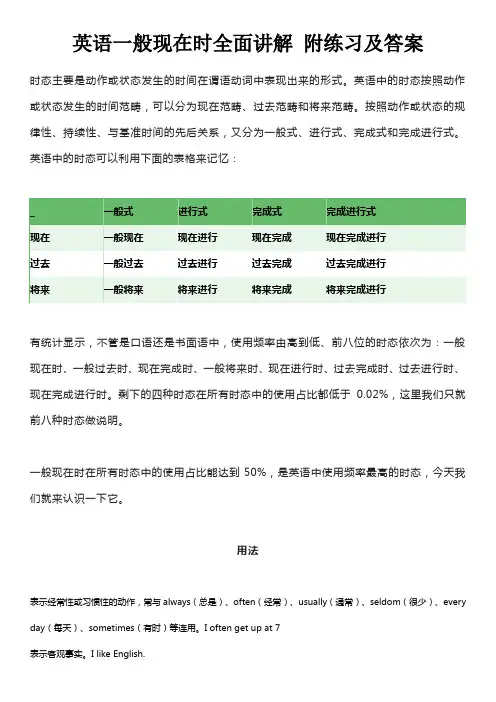
英语一般现在时全面讲解附练习及答案时态主要是动作或状态发生的时间在谓语动词中表现出来的形式。
英语中的时态按照动作或状态发生的时间范畴,可以分为现在范畴、过去范畴和将来范畴。
按照动作或状态的规律性、持续性、与基准时间的先后关系,又分为一般式、进行式、完成式和完成进行式。
英语中的时态可以利用下面的表格来记忆:有统计显示,不管是口语还是书面语中,使用频率由高到低、前八位的时态依次为:一般现在时、一般过去时、现在完成时、一般将来时、现在进行时、过去完成时、过去进行时、现在完成进行时。
剩下的四种时态在所有时态中的使用占比都低于0.02%,这里我们只就前八种时态做说明。
一般现在时在所有时态中的使用占比能达到50%,是英语中使用频率最高的时态,今天我们就来认识一下它。
用法表示经常性或习惯性的动作,常与always(总是)、often(经常)、usually(通常)、seldom(很少)、every day(每天)、sometimes(有时)等连用。
I often get up at 7表示客观事实。
I like English.表示按计划或时间表要发生的事,通常都有一个表示未来时间的状语,如:Are you free tonight? The train leaves in five minutes' time.含be动词的结构含be动词的一般现在时要注意be动词的选用,以及肯定句、否定句、一般疑问句和特殊疑问句的句子结构。
肯定句结构:主语+am/is/are+表语。
比如:I am a teacher. 此时be动词的缩略形式有:I am=I’m; he is=he’s; she is=she’s; it is=it’s; we are=we’re; you are=you’re; they are=they’re。
否定句结构:主语+am/is/are+not+表语。
比如:I’m not a student. 此时be动词的缩略形式有:I am not=I’m not; he is not=he’s not=he isn’t; she is not=she’s not=she isn’t; it is not=it’s not=it isn’t; we are not=we’re not=we aren’t; you are not=you’re not=you aren’t; they are not=they’re not=they aren’t。

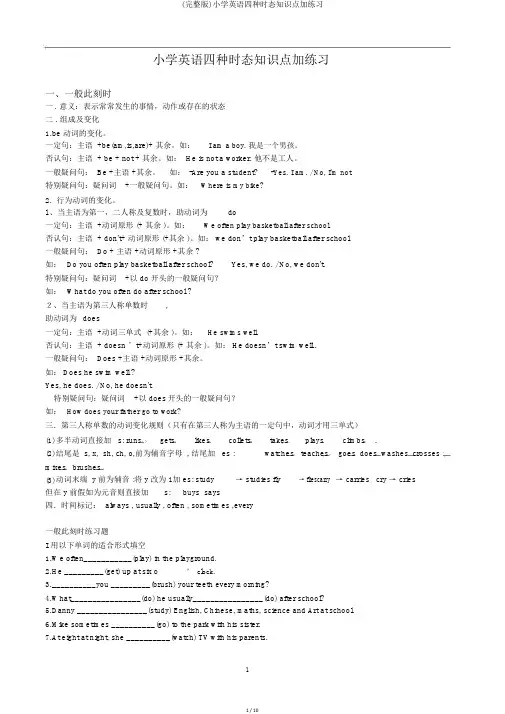
小学英语四种时态知识点加练习一、一般此刻时一. 意义:表示常常发生的事情,动作或存在的状态二 . 组成及变化1.be 动词的变化。
一定句:主语 +be(am,is,are)+ 其余。
如:I am a boy. 我是一个男孩。
否认句:主语 + be + not + 其余。
如: He is not a worker. 他不是工人。
一般疑问句: Be +主语 +其余。
如:-Are you a student?-Yes. I am. / No, I'm not.特别疑问句:疑问词+一般疑问句。
如:Where is my bike?2.行为动词的变化。
l 、当主语为第一,二人称及复数时,助动词为do一定句:主语 +动词原形 (+ 其余 )。
如:We often play basketball after school.否认句:主语 + don't+ 动词原形 (+其余 )。
如: we don’t play basketball after school.一般疑问句: Do + 主语 +动词原形 +其余 ?如:Do you often play basketball after school?Yes, we do. / No, we don't.特别疑问句:疑问词+以 do 开头的一般疑问句?如:What do you often do after school ?2、当主语为第三人称单数时,助动词为does一定句:主语 +动词三单式 (+其余 )。
如:He swims well.否认句:主语 + doesn ’t+动词原形 (+ 其余 )。
如: He doesn’t swim well..一般疑问句: Does +主语 +动词原形 +其余。
如: Does he swim well ?Yes, he does. / No, he doesn't.特别疑问句:疑问词+以 does开头的一般疑问句?如:How does your father go to work?三.第三人称单数的动词变化规则(只有在第三人称为主语的一定句中,动词才用三单式)(1) 多半动词直接加 s: runs gets likes collets takes plays climbs .(2) 结尾是 s, x, sh, ch, o,前为辅音字母 , 结尾加 es : watches teaches goes does washes crosses mixes brushes(3) 动词末端 y 前为辅音 :将 y 改为 i 加 es: study → studies fly → fliescarry → carries cry → cries但在 y 前假如为元音则直接加s: buys says四.时间标记: always , usually , often , sometimes ,every一般此刻时练习题I.用以下单词的适合形式填空1.We often___________(play) in the playground.2.He _________(get) up at six o’ clock.3.__________you _________(brush) your teeth every morning?4.What________________(do) he usually________________(do) after school?5.Danny ________________(study) English, Chinese, maths, science and Art at school.6.Mike sometimes __________(go) to the park with his sister.7.At eight at night, she __________(watch) TV with his parents.8.________ Mike________(read) English every day?9.How many lessons_________your classmates________(have) on Monday?10.What time_________his mother_________(do) the housework?II.改句子1.Do you often play football after school? (改为一定句)2.I have many books. (改为否认句)3.Gao Shan ’ s sister likes playing table tennis(改为否认句)4.She lives in a small town near New York. (改为一般疑问句)5.I watch TV every day. (改为一般疑问句)6.We have four lessons.(改为否认句)7.Nancy doesn’ t run fast(改为一定句)二、此刻进行时一、观点此刻进行时表示说话时正在进行或发生的动作 ,也可表示目前一段时间内的活动或现阶段正在进行的动作。
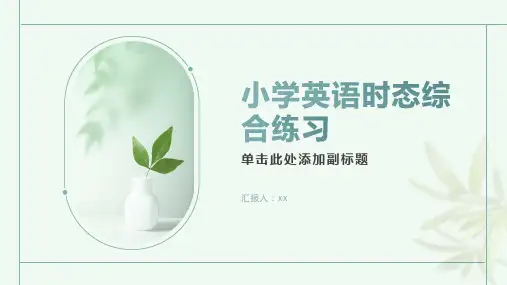
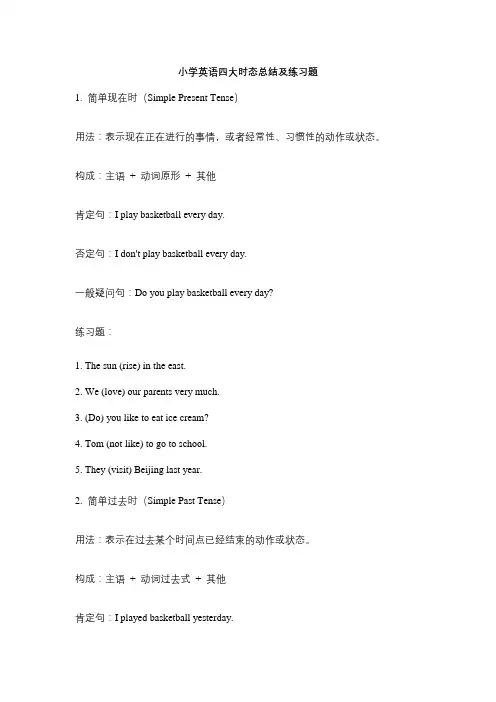
小学英语四大时态总结及练习题1. 简单现在时(Simple Present Tense)用法:表示现在正在进行的事情,或者经常性、习惯性的动作或状态。
构成:主语+ 动词原形+ 其他肯定句:I play basketball every day.否定句:I don't play basketball every day.一般疑问句:Do you play basketball every day?练习题:1. The sun (rise) in the east.2. We (love) our parents very much.3. (Do) you like to eat ice cream?4. Tom (not like) to go to school.5. They (visit) Beijing last year.2. 简单过去时(Simple Past Tense)用法:表示在过去某个时间点已经结束的动作或状态。
构成:主语+ 动词过去式+ 其他肯定句:I played basketball yesterday.否定句:I didn't play basketball yesterday.一般疑问句:Did you play basketball yesterday?练习题:1. Mary (go) to the park yesterday.2. We (have) a party last night.3. (Did) you see the movie yesterday?4. Lucy (not want) to go to the zoo last week.5. They (visit) their grandparents last weekend.3. 现在进行时(Present Continuous Tense)用法:表示正在进行的动作。
构成:主语+ be动词(am, is, are)+ 动词ing + 其他肯定句:I am playing basketball now.否定句:I am not playing basketball now.一般疑问句:Are you playing basketball now?练习题:1. My sister (watch) TV at the moment.2. We (not study) English now.3. (Is) he swimming in the river?4. Lucy (not listen) to music now.5. They (play) volleyball in the park.4. 将来时(Future Tense)用法:表示将要发生的动作或状态。
语法突击:小学英语必须掌握的4大时态讲解(附专项练习和答案)时态是英语中一个重要的语法范畴,小学英语主要是如下的四大时态:一般现在时、现在进行时、一般过去时、一般将来时。
都学一在这里帮大家整理总结了小学英语四种时态的用法,希望大家可以熟练掌握。
一般现在时主要描述经常会发生的动作、状态或不变的真理。
句末常出现every day/week/year/Monday , in the morning;句中常有always, usually, often,sometimes组成1.主语 be 名词(形容词)I am a student.He is tall.否定句:在be 后加notI am not a student.He is not tall.疑问句:be 动词提前到第一位。
Are you a student?Yes,I am./No,I am not.Is he tall?Yes,he is./No,he isn’t.组成2.主语动词地点时间We go to school on Monday.He goes to the park on Sunday.否定句:主语 don’t/doesn’t’t 动词原形地点时间We don’t go to school on Monday.He doesn’t go to the park on Sunday.疑问句:在句首加do或doesDo you go to school on Monday?Yes, we do./ No, we don’t.Does he go to the park on Sunday?Yes, he does./ No, he doesn’t.动词第三人称单数变化1. 在原单词末尾加s , 如:like – likes2. 单词以o, sh, ch, s, x 结尾加es, 如:go – goes3. 单词末尾为辅音 y结尾去y加ies 如:study- studies现在进行时主要叙述正在发生的事情。
小学英语语法【一】一般现在时一般现在时基本用法介绍一、一般现在时的功能1.表示事物或人物的特征、状态。
如:The sky is blue.天空是蓝色的。
2.表示经常性或习惯性的动作。
如:I get up at six every day.我每天六点起床。
3.表示客观现实。
如:The earth goes around the sun.地球绕着太阳转。
一般现在时用法练习一、出下列动词的第三人称单数drink ________ go _______ stay ________ make ________look _________ have_______ pass_______ carry ____ come________ watch______ plant_______fly ________study_______ brush________ do______ teach_______ likeplay read wash be二、用括号内动词的适当形式填空。
1.He often ________(have) dinner at home.2.Daniel and Tommy _______(be) in Class One.3.We _______(not watch) TV on Monday.4.Nick _______(not go) to the zoo on Sunday.5.______ they ________(like) the World Cup?6.What _______they often _______(do) on Saturdays?7._____ your parents _______(read) newspapers every day?8.The girl _______(teach) us English on Sundays.9.She and I ________(take) a walk together every evening.10.There ________(be) some water in the bottle.11.Mike _______(like) cooking.12.They _______(have) the same hobby.13.My aunt _______(look) after her baby carefully.14.You always _______(do) your homework well.15.I _______(be) ill. I’m staying in bed.16.She _______(go) to school from Monday to Friday.17.Liu Tao _______(do) not like PE.18.The child often _______(watch) TV in the evening.19.Su Hai and Su Yang _____(have) eight lessons this term.20. -What day _____(be) it today?- It’s Saturday.三、按照要求改写句子2.I do my homework every day.(改为一般疑问句,作否定回答)_____________________________________________________ 3.She likes milk.(改为一般疑问句,作肯定回答)__________ ____________ ____4.Amy likes playing computer games.(改为一般疑问句,作否定回答)_______________________ ____________6.He speaks English very well.(改为否定句)_______________________________________________ 7.John comes from Canada.(对划线部分提问)_______________________一般现在时练习1.He often(have)dinner at home.2.Daniel and Tommy(be)in Class One.3.We(not watch)TV on Monday.4.Nick(not go)to the zoo on Sunday.5.they(like)the World Cup?6.What they often(do)on Saturdays?7.your parents(read)newspapers every day?8.The girl(teach)us English on Sundays.9.She and I(take)a walk together every evening.10.There(be)some water in the bottle.小学英语语法【二】现在进行时现在进行时1.现在进行时表示现在正在进行或发生的动作,也可表示当前一段时间内的活动或现阶段正在进行的动作。
小学英语语法大全-附练习题Contents第一章名词1.名词的数2.名词的格第二章代词1.人称代词2.物主代词第三章冠词与数词1.冠词2.数词第四章一般现在时态第五章现在进行时态第六章句型1.陈述句2.疑问句3.祈使句4.There be 句型与have\ has第七章总结考试第一章名词(Noun)名词的概念在生活中,我们会接触到各种各样的人和事物,用来表示这些人或事物名称的词就是名词。
一、名词的数名词的数指名词的单数和复数形式。
可数名词表示“一个”时用单数,“两个以上”时用复数;不可数名词表示量时,通常用“数词+单位+of+物质名词”的形式,如a piece of bread (一片面包),变为复数时,只须将单位名词变为复数,如:two pieces of bread(两片面包)。
*名词复数的构成法则1. 一般情况下在词尾加 s. 词尾读音shop --- shops (商店) 在清辅音后读[ s ]bag --- bags (书包) 在浊辅音后读[ z ]window --- windows (窗户) 在元音后读[ z ]2. 以s, x, sh, ch 结尾的单词在词尾加es。
class --- classes (班级) 词尾读音[ iz ]box --- boxes (盒子)match --- matches (比赛)brush --- brushes (刷子)3. 以“辅音字母+y”结尾的词,变y为i 加es.story --- stories (故事) 词尾读音[ iz ]4. 以“元音字母+y”结尾的词,在词尾直接加skey --- keys 词尾读音[ z ]monkey --- monkeys5.以“o”结尾的名词,复数一般在词尾加“s”, 但个别加“es”tomato --- tomatoes (西红柿) 词尾读音[ z ]potato --- potatoes (土豆)zoo --- zoos (动物园)photo --- photos (照片)*(以“o”结尾,复数加“es”)口诀:黑人(Negro)英雄(hero),左手拿着西红柿(tomato),右手拿着破土豆(potato),头顶一个大芒果(mango)。
动词时态一般现在时的基本概念一般现在时表示现在经常反复发生的动作、存在的状态或习惯性的动作的时态。
常见的标志词(时间状语)主要有:every…, sometimes, at…, on Sundays, uauslly often, never, always等。
一般现在时的结构be动词的一般现在时主语+ Be动词+ 其他成分I am a boy.实义动词的一般现在时主语+ 行为动词+ 其他成分We study English.一般现在时的具体形式be动词的一般现在时1.第一人称单数I+amI am a student.2.第二人称单数you和其他人称复数we/you/they+areYou are a lucky girl.We are students in this school.3.第三人称单数he/she/it+isShe is my teacher.例题:用be动词的适当形式填空。
1.I from China.2.It very hot today.3.They in the hospital.4.We good students.5.She a beautiful girl.答案:1.am,主语是第一人称单数形式。
2.is,主语是第三人称单数形式。
3.are,主语是第三人称复数形式。
4.are,主语是第一人称复数形式。
5.is,主语是第三人称单数形式。
实义动词的一般现在时1.第一、二人称单数I/you和其他人称复数we/you/they+动词原形I get up at 8 o’clock.They go to school everyday.2.第三人称单数he/she/it+实义动词第三人称单数形式It runs fast.He studies hard.例题:用说给单词的适当形式填空。
1.We home every day.(go)2.Trees green in spring.(turn)3.He very hard.(study)4.The boy up at seven O'clock.(get)5.The earth round the sun.(move)答案:1.go,句子主语we为第一人称复数形式。
小学英语语法【一】一般现在时一般现在时基本用法介绍一、一般现在时的功能1.表示事物或人物的特征、状态。
如:The sky is blue.天空是蓝色的。
2.表示经常性或习惯性的动作。
如:I get up at six every day.我每天六点起床。
3.表示客观现实。
如:The earth goes around the sun.地球绕着太阳转。
一般现在时用法练习一、出下列动词的第三人称单数drink ________ go _______ stay ________ make ________look _________ have_______pass_______ carry ____ come________ watch______ plant_______fly ________study_______ brush________ do______ teach_______ like play read wash be二、用括号内动词的适当形式填空。
1.He often ________(have) dinner at home.2.Daniel and Tommy _______(be) in Class One.3.We _______(not watch) TV on Monday.4.Nick _______(not go) to the zoo on Sunday.5.______ they ________(like) the World Cup?6.What _______they often _______(do) on Saturdays?7._____ your parents _______(read) newspapers every day?8.The girl _______(teach) us English on Sundays.9.She and I ________(take) a walk together every evening.10.There ________(be) some water in the bottle.11.Mike _______(like) cooking.12.They _______(have) the same hobby.13.My aunt _______(look) after her baby carefully.14.You always _______(do) your homework well.15.I _______(be) ill. I'm staying in bed.16.She _______(go) to school from Monday to Friday.17.Liu Tao _______(do) not like PE.18.The child often _______(watch) TV in the evening.19.Su Hai and Su Yang _____(have) eight lessons this term.20. -What day _____(be) it today?- It's Saturday.1三、按照要求改写句子2.I do my homework every day.(改为一般疑问句,作否定回答)_____________________________________________________3.She likes milk.(改为一般疑问句,作肯定回答)__________ ____________ ____4.Amy likes playing computer games.(改为一般疑问句,作否定回答)___________________________________6.He speaks English very well.(改为否定句)_______________________________________________7.John comes from Canada.(对划线部分提问)_______________________一般现在时练习1. He often (have) dinner at home.2. Daniel and Tommy (be) in Class One.3. We (not watch) TV on Monday.4. Nick (not go) to the zoo on Sunday.5. they (like) the World Cup?6. What they often (do) on Saturdays?7. your parents (read) newspapers every day?8. The girl (teach) us English on Sundays.9. She and I (take) a walk together every evening.10. There (be) some water in the bottle.小学英语语法【二】现在进行时现在进行时1.现在进行时表示现在正在进行或发生的动作,也可表示当前一段时间内的活动或现阶段正在进行的动作。
2.现在进行时的肯定句基本结构为be+动词ing.3.现在进行时的否定句在be后加not。
4.现在进行时的一般疑问句把be动词调到句首。
5.现在进行时的特殊疑问的基本结构为:疑问词+ be + 主语 + 动词ing?但疑问词当主语时其结构为:疑问词+ be + 动词ing?标志词:look now listen It's +点钟动词加ing的变化规则1.一般情况下,直接加ing,如:cook-cooking2.以不发音的e结尾,去e加ing,如:make-making, taste-tasting ,write—writing ,ride—riding ,have—having come—coming dance—dancing live—living take—taking skate—skating3.如果末尾是一个元音字母和一个辅音字母,双写末尾的辅音字母,再加ing,如:swim—swimming begin—beginning run-running, sit—sitting put —puttingget—getting shop—shopping stop-- stopping2现在进行时练习一、写出下列动词的现在分词:play________ run__________ swim _________make__________go_________ skate________write________ ski___________read________ have_________ sing ________ dance_________put_________ see________ buy _________love____________live_______take_________ come ________ get_________stop_________ sit ________ begin________shop___________二、用所给的动词的正确形式填空:1.The boy __________________ ( draw)a picture now.2. Listen .Some girls _______________ ( sing)in the classroom .3. My mother _________________ ( cook )some nice food now.4. What _____ you ______ ( do ) now?5. Look . They _______________( have) an English lesson .6.They ____________(not ,water) the flowers now.7.Look! the girls ________________(dance )in the classroom .8.What is our granddaughter doing? She _________(listen ) to music.9. It's 5 o'clock now. We _____________(have)supper now10.______Helen____________(wash )clothes? Yes ,she is .三、句型转换:1. They are doing housework .(分别改成一般疑问句和否定句)__________________________________________________________________________________________________________________________2.The students are cleaning the classroom . ( 改一般疑问句并作肯定和否定回答)__________________________________________________________________________________________________________________________________3.I'm playing the football in the playground .(对划线部分进行提问)_________________________________________________________________小学英语语法【三】一般将来时一、概念:表示将要发生的动作或存在的状态及打算、计划或准备做某事。
句中一般有以下时间状语:tomorrow, next day(week, month, year…),soon, the day after tomorrow(后天)等。
二、基本结构:①be going to + do;②will+ do.三、否定句:在be动词(am, is, are)后加not或情态动词will后加not成won't。
例如:I'm going to have a picnic this afternoon.→ I'm not going to have a picnicthis afternoon.四、一般疑问句: be或will提到句首,some改为any, and改为or,第一二人称互换。